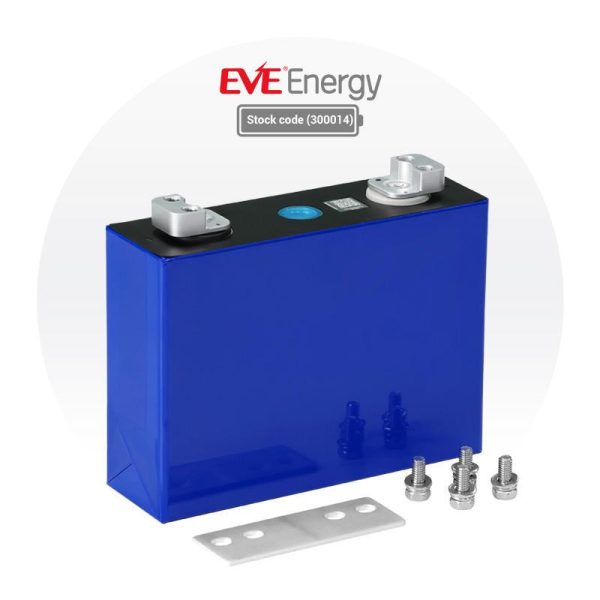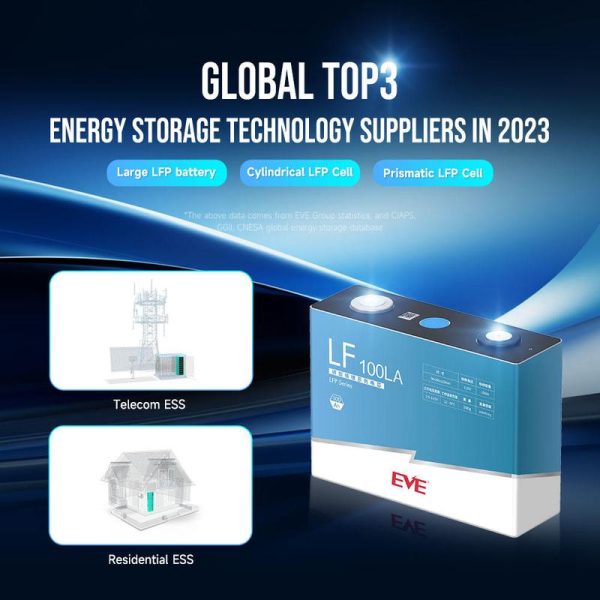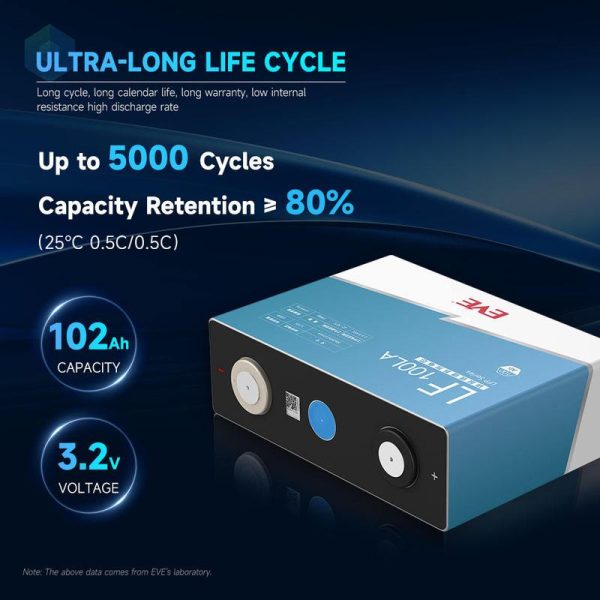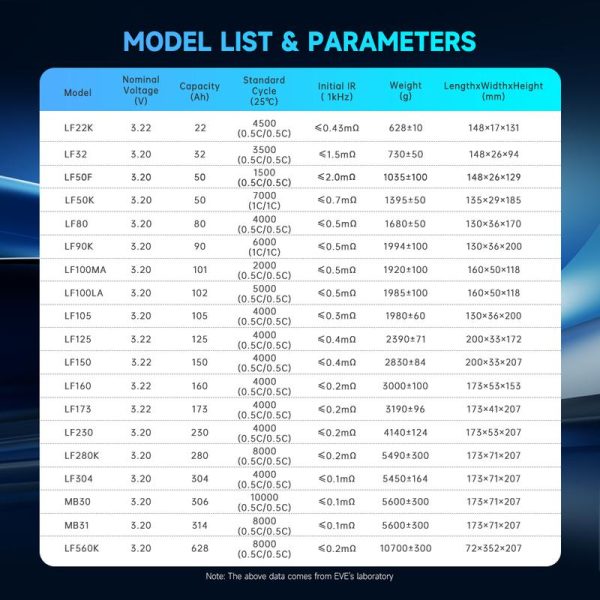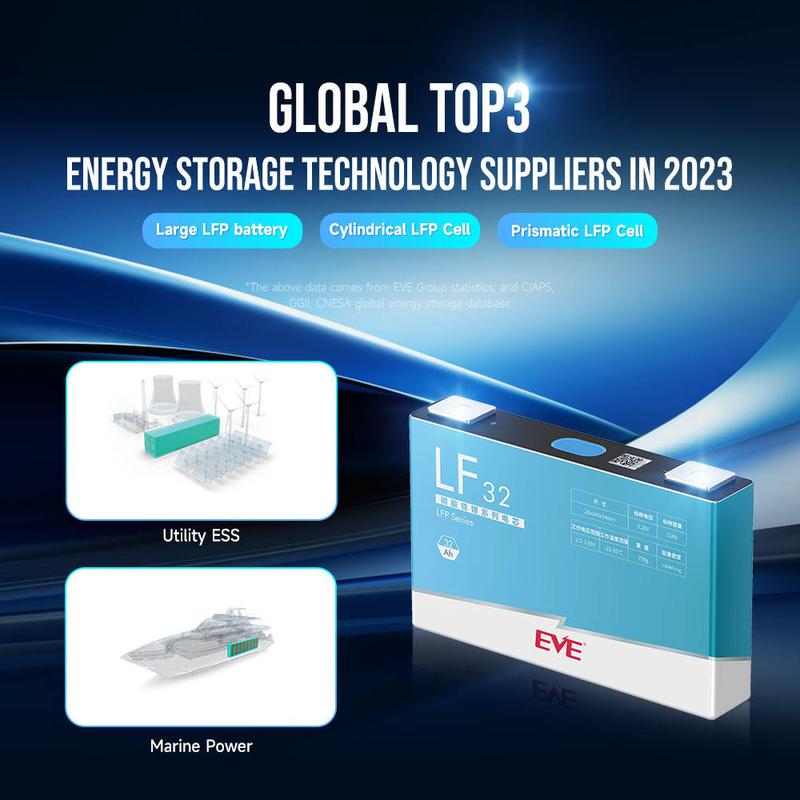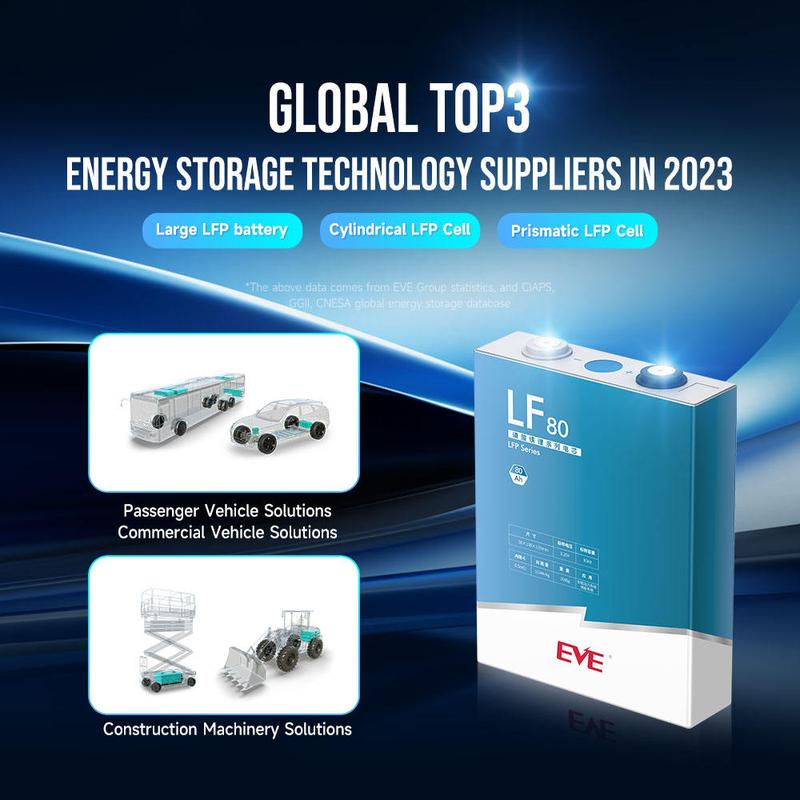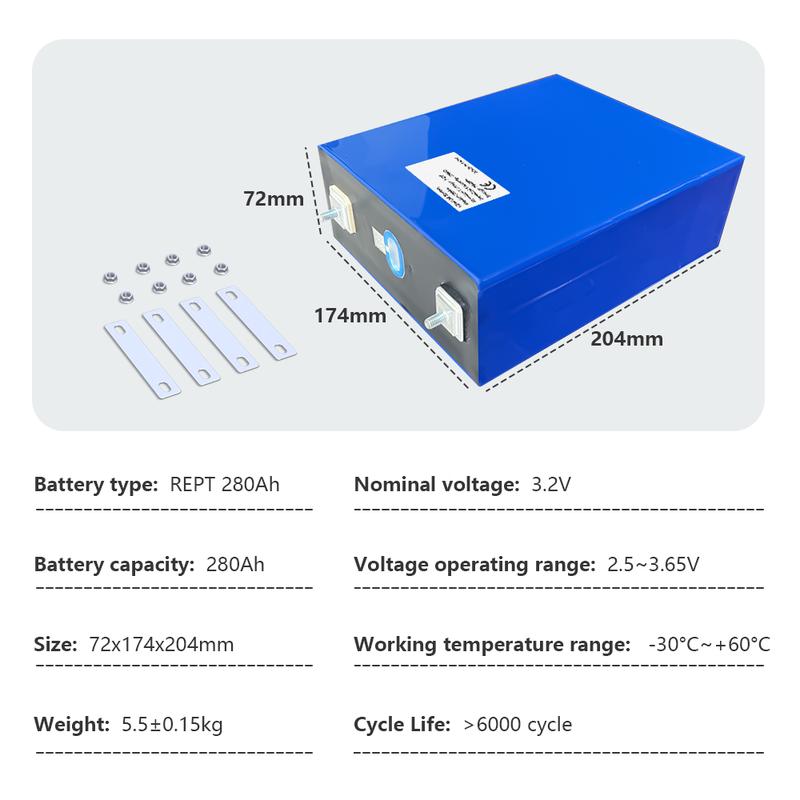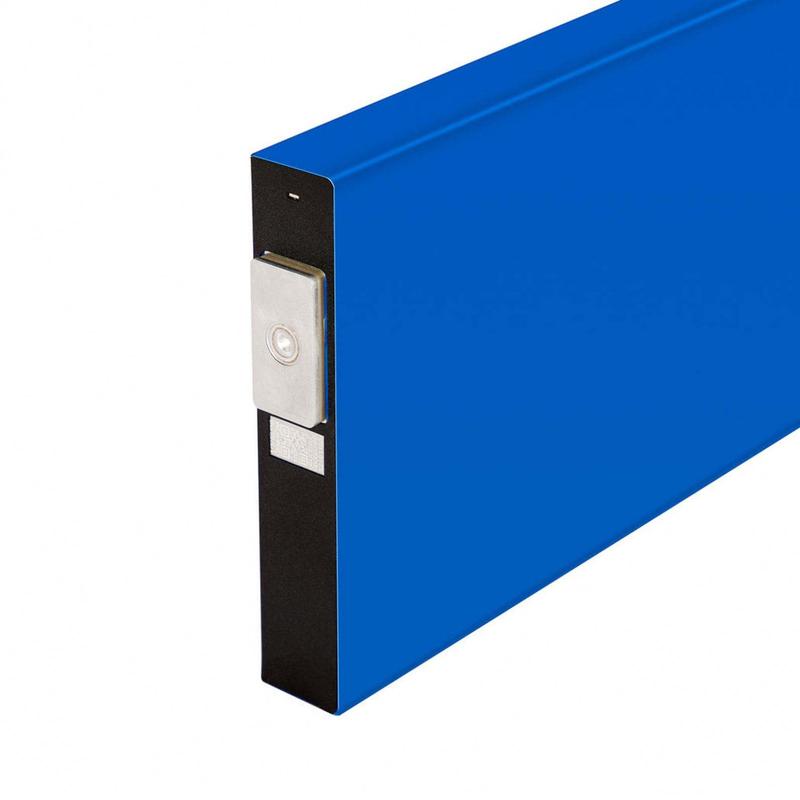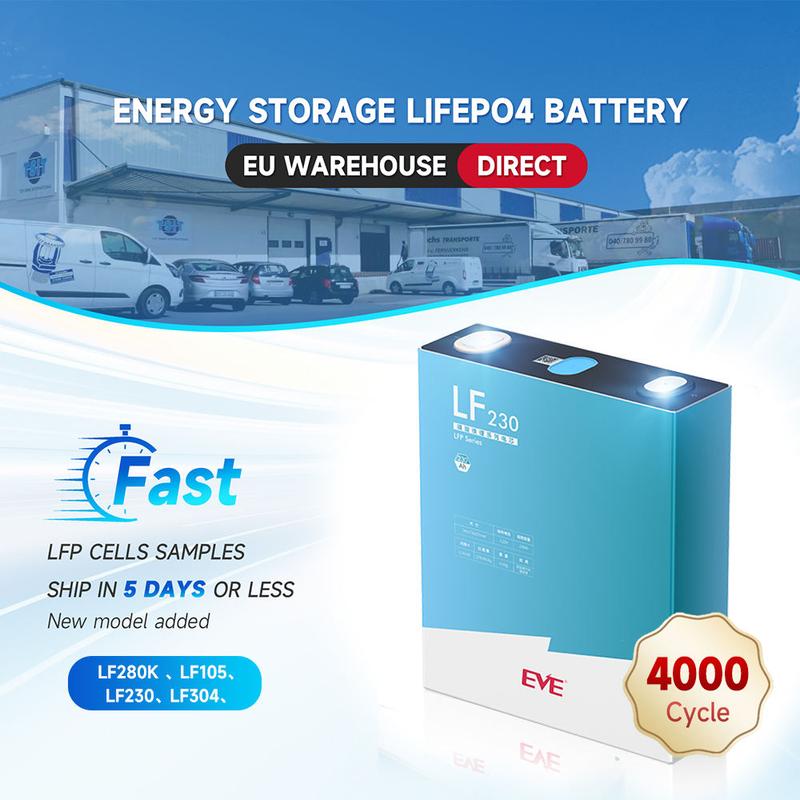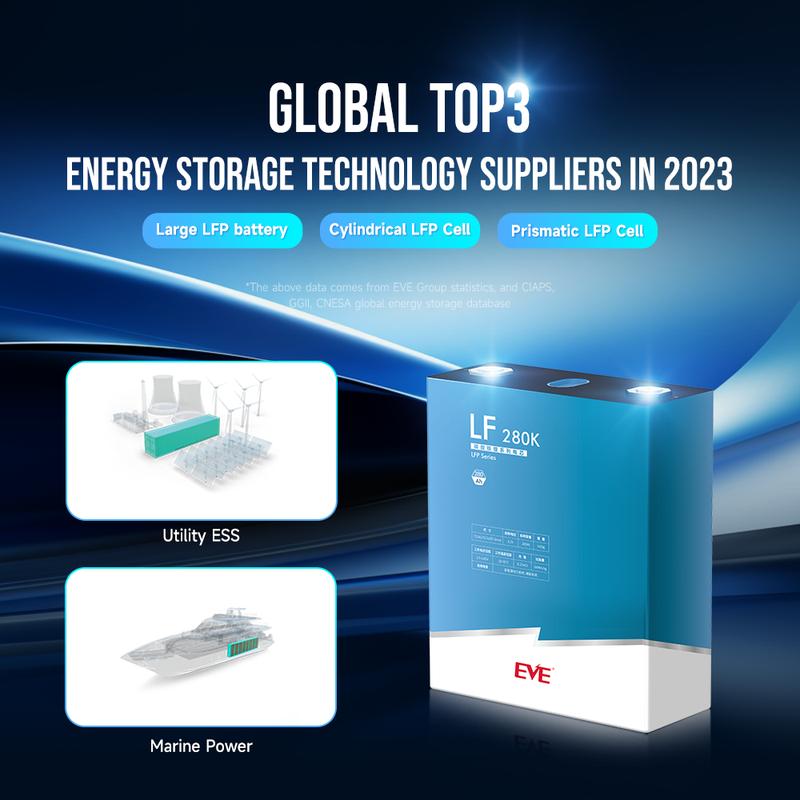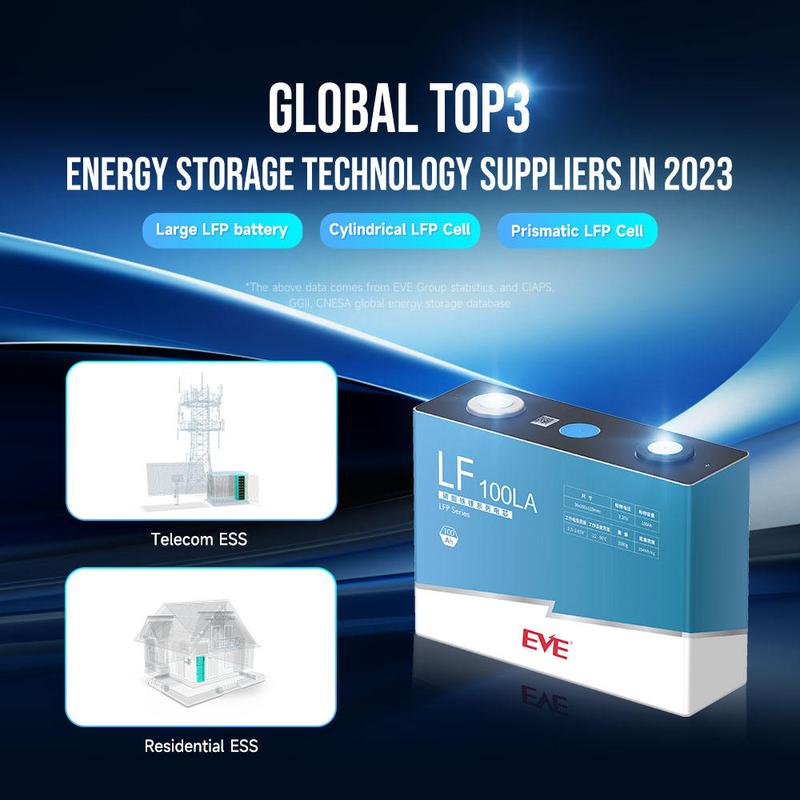-
Guoli Building, Zhonghang Road
EVE LF100LA 3.2v 100ah 105ah Lifepo4 Battery
Attributes
| Item | Description |
| Battery Size | LFP |
| Application | Electric Power Systems, Solar Energy Storage Systems |
| Cycle Life | 5000 cycles |
| Cathode Materials | LiFePO4 |
| Model Number | LF100LA |
| Operating Temperature | 0℃~55℃ |
| Brand Name | EVE |
| Battery Type | liquid |
| Weight | 1.98±0.05 kg |
| Place of Origin | Guangdong, China |
| Product Name | EVE LF100LA 3.2V 100Ah energy storage battery lifepo4 battery |
| Capacity | 100Ah ; 105Ah |
| Voltage | 3.2V |
| Continuous Charge/Discharge | 1C/1C |
| Pulse Charge/Discharge (30s) | 2C/2C |
| Standard Charge-Discharge Rate | 0.5C(P) |
| Cycling Performance | ≥5000 cycles (25℃), ≥3500 cycles (35℃) |
| Charging Temperature | 0℃~55℃ |
| Discharging Temperature | -20℃~55℃ |
| Storage Temperature | 0℃~35℃ |
| Selling Units | Single item |
| Package Size | 100×100×100 cm |
| Gross Weight | 100.000 kg |
Core Application Scenarios
- Solar Energy Storage Systems
Ideal for residential or commercial solar storage, supporting both off-grid and grid-tied configurations. 3.2V cells can be connected in series to build 24V/48V systems. - Electric Vehicles
Powers golf carts, forklifts, and low-speed EVs (e.g., tricycles, wheelchairs) with stable high-rate discharge capabilities. - Industrial Automation
Energizes AGVs, robots, and equipment requiring frequent charge/discharge cycles, with modular design for flexible integration. - Telecom Backup Power
Ensures reliable power supply for remote telecom stations in extreme cold (-20°C). - Grid & Residential Energy Storage
Used for grid peak shaving and home energy storage (e.g., 51.2V/585Ah battery packs), balancing high capacity and long lifespan.
Note
- Temperature Control
Operate within 0~55°C(charging)and **-20~55°C**(discharging)to prevent degradation. - Voltage Balancing & Safety
Ensure uniform cell voltages in series connections (e.g., 8 cells for 24V) to avoid overcharge/over-discharge risks. - BMS Requirement
A Battery Management System (BMS) is mandatory for real-time monitoring of voltage, temperature, and SOC. - Certification Compliance
Export requires UN38.3, MSDS, CE/RoHS certifications. Regional regulations (e.g., WERCS) may apply for retail. - Storage & Maintenance
Store at 15~25°C with 50% SOC to prolong lifespan. Avoid high humidity and perform regular inspections.
10 things to note when purchasing products from China
Help Center
Have a query? Please check this question and answers
It is prohibited to mix different brands or batches of batteries for reasons including:
Capacity difference: CATL 280Ah and EVE LF280K actual capacity error ±3%, parallel connection may lead to reverse charging loss;
Inconsistency in internal resistance: BMS equalization fails after mixing, accelerating the attenuation of the weakest monomer in the group (barrel effect).
Solution: Separate the capacity and selection before grouping to ensure that the difference in internal resistance is less than 1mΩ and the difference in voltage is less than 10mV.
The products are UN38.3 (aviation safety certification), CE (European Union access), RoHS (no hazardous substances) certified
In the case that the description of the battery you are shopping for states that it still works at that temperature, the capacity drops to 50%-60% at -20°C, it is recommended:
Optional low temperature electrolyte (boost 10%-15% capacity);
Add preheating system (e.g. solar energy storage scenario).
High temperature protection: 55°C is the upper working limit, need to:
Avoid direct sunlight (add sunshade for outdoor installation);
Regularly check the cooling ducts and keep the distance between batteries ≥ 5cm
It is strongly recommended to use the original matching charger. The battery supports 1C standard charging (280A current), if using a non-specialized charger may lead to:
Risk of overcharging: over-voltage of ordinary lead-acid charger (e.g. 58.4V for Li-ion Sainty) may trigger the protection board to lock up;
Loss of efficiency: non-matching chargers may not be able to activate the BMS equalization function, resulting in widening the voltage difference between single units.
Recommended configuration: 48V system using 58.4V lithium iron phosphate special charger, support Bluetooth module real-time monitoring of the charging status.
Protective measures: wear insulating gloves and goggles, use matching copper rows (free connectors included) to reduce contact resistance;Environmental requirements: working temperature -20°C~55°C, humidity <70%, avoid direct sunlight;
Parallel/series connection rules: parallel connection requires the same cell capacity, series connection requires the configuration of active equalization BMS.
Q: How to extend the overall life of the battery pack?
A: Follow the “barrel theory” – check the weakest cell regularly:
Use a voltmeter to check the consistency of the cells every month;
Avoid frequent fast charging (>1C) or deep discharging (<10%);
For energy storage scenarios, we recommend charging to 90% and discharging to 20% to slow down the degradation.
Lithium iron phosphate battery capacity drops to 50-60% of normal at -20°C (about 70% for ternary batteries)
If the voltage of the whole pack is lower than the nominal value or the temperature of a single unit is too high, it may be due to wrong connection, short circuit or poor cell consistency.
Suggestion: Check whether the electrode connection is loose or reversed;
Use active equalization module to balance the voltage of the cell;
Replace the monobloc with abnormal performance

